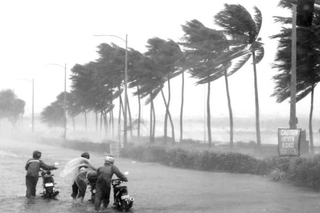
Depression, Risk of Suicide is Worsening With Severe Heatwaves, Floods: Study
Climate change impacts, trauma, and depression create a “vicious” cycle that must be broken, scientists say.

Scientists have warned that climate change — manifesting in the form of heatwaves and extreme weather events like floods, cyclones, and droughts globally — is impacting the mental health and well-being of millions of people worldwide.
The report was published this month by the Imperial College London and, according to the study’s authors, policymakers are yet to grasp the scale of the implications of climate change on mental health and, subsequently, on the economy. The effect of climate change on mental health “is a big problem that is going to affect more and more people into the future, and in particular, exacerbate inequality. It is very likely to be a really big unaccounted cost,” Dr. Emma Lawrance, who is part of the medical faculty at the ICL, and led the report, told The Guardian.
The link between climate change and mental health is more direct and tangible than one might imagine. “If you have lost your home, if you’re at risk of repeated flooding, if you’re grieving because you’ve lost a family member to a fire or your livelihood because of a drought, that is shock and trauma that translates for some into very prolonged distress and diagnoses of PTSD [post traumatic stress disorder], anxiety, depression and increased risk of suicide,” Dr. Lawrence explained.
Moreover, a 2018 study published in Nature Climate Change established a direct link between rising temperatures and increased rates of suicide — even going on to suggest that the impact of climate change on suicides may be comparable to the impact of economic recessions on self-harm.
A 2013 study also found evidence of increasing temperatures leading to a rise in violence among people. “…mental health of coming generations will be tested as never before by the cumulative and rolling impacts of disasters. These effects will include PTSD, depression, anxiety, substance use and explosive anger leading to family and domestic violence,” Amy Coopes, journalist and medical student from Australia, wrote this month.
Related on The Swaddle:
Climate Change Could End Human Civilization by 2050
But the impact on mental health also extends to people who haven’t directly been affected by disasters by triggering “eco-anxiety,” which is defined by the American Psychological Association as “a chronic fear of environmental doom.” The American Psychiatric Association (APA), which lays down the diagnostic criteria for mental health disorders, has already recognized climate change as an increasing threat to mental health.
In fact, a 2020 survey by the APA found that 67% of those surveyed were anxious about the impact of climate change on the earth, and 55% about its impact on their own mental health. “It’s only natural to feel anxious in the face of a melting planet and the sixth mass extinction, both wrought by human actions … As individuals, it’s easy to feel helpless to stop the destruction of the biosphere,” an article on Scientific American reads.
The uncertainty about what their future on the planet will look like is impacting younger generations. “Anecdotally there are rising rates of distress, and it is going to affect a huge number of people. The grief and fear that comes with that, and especially for young people who see inaction on climate, can really exacerbate distress,” Dr. Lawrence noted. In fact, German and Dutch courts have directed their respective governments to ramp up the fight against climate change to protect present and future citizens’ rights to life and well-being.
Despite the impact of climate change on mental health, less than 1% of more than 50,000 medical research papers on climate change in the last decade explored mental health-related ramifications, the present study found. “The gap between knowing the impacts and being able to quantify the impacts … is holding us back,” Dr. Lawrence told Reuters.
“The climate and ecological emergency is a mental health emergency. Our mental health is entwined with the health of our natural world,” Dr. Adrian James, president of the Royal College of Psychiatrists in the U.K., who wasn’t involved in the study, had told the press earlier this month. “This is a landmark paper providing an essential summary for governments and healthcare services alike,” he said yesterday, commenting on the present study.
Devrupa Rakshit is an Associate Editor at The Swaddle. She is a lawyer by education, a poet by accident, a painter by shaukh, and autistic by birth. You can find her on Instagram @devruparakshit.
Related


Solar Storms Are Back. How Do They Affect Life on Earth?
